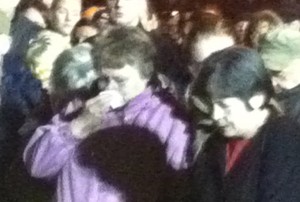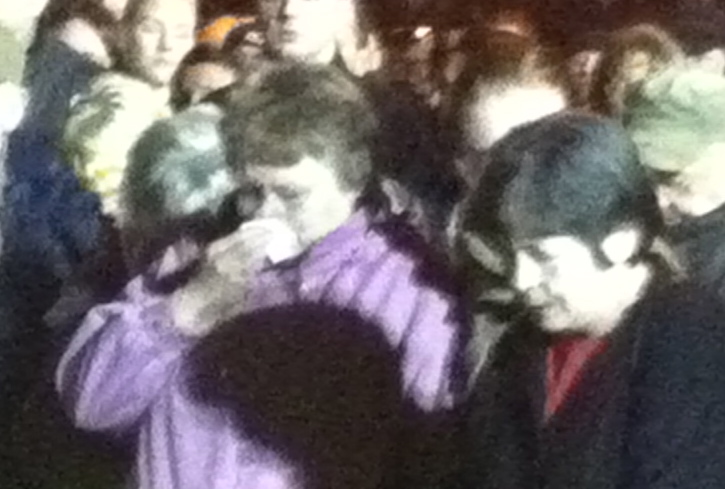There were heartbreaking scenes in Greysteel last night when survivors and relatives of those killed in the Rising Sun Bar massacre gathered in silence to mark the 20th anniversary of the atrocity.
by John Gill

Ellie Burns whose husband John was shot dead in the Rising Sun massacre pictured at tonight’s memorial service outside the pub..
Seven men and women, Catholic and Protestant, died when UFF gunmen opened fire in the Greysteel bar on 30 October 1993. An eighth man died six months later from wounds sustained in the attack. Nineteen people were injured in what was regarded as one of the worst atrocities of the Troubles.
There were emotional scenes as around 1,000 people – including the wounded and those who attended the dead and injured on the night of the killings – gathered at a memorial plaque adjacent to the pub where the shootings took place.
Family and friends wept and comforted each other during a short cross-community prayer service and a “moment of silence” to remember the eight victims.
The service ended with a song performed by the choir from Faughanvale Primary School.
Earlier, the people of Greysteel were described as “ordinary people who were asked to carry the pain inflicted by men who were driven by hate.”
The comment was made by Fr Stephen Kearney, a curate in Faughanvale at the time of the massacre and who administered the Last Rites to the dead and dying 20 years earlier.
Fr Kearney was the chief concelebrant at a special anniversary Mass in St Mary’s Star of the Sea Church.
Describing the killings as “evil,” Fr Kearney told a packed church the lives of the people of Greysteel had been “seriously touched” by the killings.
Fr Kearney said: “The outstanding quality of the people who suffered physically in the shootings, and emotionally from their losses on the night of 30 October 1993, was and still is their great respect for each other, for their neighbours and for the outsiders who got in contact with them.
“You saw yourselves as ordinary people who were asked to carry the extraordinary pain inflicted by men who were driven by hate, bitterness and an inhuman lust for cruelty.
“You did that by supporting each other, by being so conscious of the pain that was in other homes like your own that rather than crying out for revenge, or even justice you accepted you own pain and used it as the tonic that gave you sensitivity to others and strength to comfort them.”
Fr Kearney added: “We all tend to forget what life was like 20 years ago. Bombings, shootings, arrests, harassment, legal and illegal checkpoints were everyday happenings.
“People had become largely hardened by the troubles and now, when we look back, we recoil in shame and disgust, in pain and in angry rejection at what was taken for normal living.”
Earlier, Fr Pat Mullan, Faughanvale parish priest, said the Rising Sun murders had brought the community closer together.
He said: “Who can ever forget the terrifying events of the evening of 30 October 1993 – 20 years to the day. But happily, far from driving a wedge in the community that horrific event had the complete opposite effect, bringing us all closer together.”
During the service, eight candles carried by a family member of each of the victims, were presented as the Offertory Gifts.
The service was presided over by retired Bishop of Derry, Most Rev Dr Edward Daly, who had presided over the funerals of the victims 20 years earlier.
Other concelebrants included Canon John Blair and Rev Bryan Hasson from the Church of Ireland and retired Presbyterian Minister the Rev Jim Grey.
Among those in attendance at the services were former SDLP leader John Hume, Derry MLA Raymond McCartney (Sinn Fein) and East Derry MLAs John Dallat (SDLP) and Cathal O hOisin (Sinn Fein).
The Ulster Freedom Fighters (UFF) said they carried out the attack in the Rising Sun in retaliation for the IRA bomb on the Shankhill Road in Belfast the previous week.
Prior to the Greysteel services, relatives of those killed in that atrocity and of workmen shot dead in a revenge attack at Belfast City Council yard, visited Greysteel and laid flowers at the memorial.
Charlie Butler, who lost three relatives in the Shankhill bombing, said the people from that community did not want what had happened in Greysteel.
He said: “It was not done for us. We did not want it. We would never have wanted it and 20 years after the people of Greysteel know that – but we felt we had to come here. We have had our memorial last week. We know how they are feeling and we are here to show solidarity and support to the people of Greysteel.”
Those killed in the Rising Sun were 19-year-old Karen Thompson, from Limavady, who died alongside her 20-year-old boyfriend Steve Mullan, from Greysteel; Joseph McDermott (60), from Greysteel and 81-year-old James Moore whose son owned the bar. The father-of-five was ordering a drink when he was gunned down.
John Moyne (50), meanwhile, pushed his wife to the floor and died protecting her and 54-year-old John Burns was shot as he walked to the bathroom.
The Protestant father of three children – a 14-year-old daughter and sons aged 16 and 19 – was a former member of the UDR and lived in Eglinton. His wife was badly injured in the atrocity.
The seventh person killed was 59-year-old Moira Duddy, who came from Greysteel. Married with six children she was sitting with her husband and two friends but was the only person hit by gunfire.
A retired farmer and former member of the B Specials in Claudy was the eighth Greysteel victim – Samuel Montgomery dropped dead six months after being wounded. Blood clots resulting from his injuries had moved to the 76-year-old’s heart and lungs.
Within two weeks of the killings, four men were arrested and brought before Limavady Magistrates Court charged with the murders. Stephen Irwin, Torrens Knight, Jeffrey Deeney and Brian McNeill were jailed for life in February 1995.
Tags:





